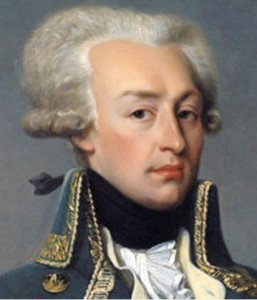
One of the wealthiest men in France and a staunch supporter of American independence, Lafayette became a national hero in both countries.
As an early volunteer for the Continentals in the American Revolution he became an aide to, and close friend of, Washington. Rising to Major General and wounded in battle he returned to France a national hero, renowned soldier, and notable revolutionary.
He commanded the National Guard in Paris then was given an Army to lead in the wars of the French Revolution. Alienated from the Revolution by the execution of the king and queen and its decline to absolutism, political intolerance, and violence, Lafayette – hero of two revolutions – left his army in the field and defected to Austria.
He spent over five years in prisons enduring harsh conditions. His triumphant return to the United States in 1824, during which time he visited both Adams and Jefferson, was a national celebration of him and of the revolution itself that was long and fondly remembered by all Americans of the time and beyond.
His legacy is a mixed one, but his character was true and his motives upright.
Something of an anti-Talleyrand, Lafayette is an attractive, tragic figure. Unwilling to personally seize power (though he could have done had he wished) and mistakenly trusting in a swiftly passing and idealized, unworkable compromise approach to political change in France, he was caught up in the whirlwind of the revolution and swept away.